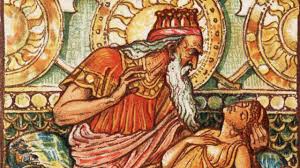The richest man in history
“If for this life only we have hoped in Christ, we are the most pitiable of people,” says St. Paul. But … I have everything I need for this life right here, between Geary and Clement streets, in San Francisco: my bank, my grocery store, ten good restaurants, a post office, my dry cleaners—even my tax lady. I am living in the wealthiest city of the wealthiest country in the world, at a time of unparalleled personal wealth (per capital wealth in America has been increasing for the last 200 years at an average of 2% a year). In 2019 dollars, the average income in 1820 was one thousand dollars per year. Today the average wage earner gets fifty-three thousand of those same dollars per year. I am the richest man in history. But, has this spectacular jump in personal wealth made me happy? Has it made us happy?
St. Paul does not deny that the things of this world are good. He knows well that, in the first chapter of the Torah, “God beheld all that he had made and found it very good.” He points, however, to good without which all of the goods of this world are, in his words, “trash.” If we or any created thing loses its essential connection to this One Good, it withers. Religion gets a bad rap these days, but the word itself literally means to “rebond” or “re-connect” (re-ligare) to that one supreme Good. True religion fundamentally reconnects us to Goodness itself, which is God. In rebinding us to God, it restores a right relationship to all of creation. In the words of Mother Teresa, “if your prayer life is alright, the rest of your life will be perfectly alright.” God first. But if our religion focuses too much on this world—if we are only a Catholic charity, a non-profit “inspired” but not governed by Jesus Christ; if we limit ourselves to social justice in this life; if we forget to make Jesus Christ our all in all, then we are the most pitiable of men. Again as Mother Teresa would remind her sisters, “we are not social workers. We are Roman Catholic nuns.”
Poverty as Jesus defines it
Our Lord in St. Luke’s version of the beatitudes is blunt: the poor are happy (“blessed”) and the rich are unhappy (“cursed”). Blessed are the poor, the hungry, the weeping, and the hated. Jesus echoes the Prophet Jeremiah from our first reading: “cursed is the man who trusts in men, who seeks strength in flesh.” In St. Augustine’s arresting image, the blessed man is “he whose roots are planted in heaven and grows from heaven downward toward earth.” If you want to be happy on earth, start with heaven. Start by believing in heaven. Our city’s restaurants and bars are full every night with seemingly oblivious people. Half are staring into their phones for stock portfolios or sport scores or political gossip, paying no attention even to the people sitting next to them. The other half are shouting superficialities at people not listening to them. Do we know that a train coming? Do we order our daily lives based on the fact that we will die, that everything in this world and this city will burn? Or do we unconsciously assume that only this life is real? It’s not. We are wayfarers. If you want to be happy in this life, start with heaven. Successful businessmen quote Steven Covey’s “start with the end in mind.” The End for every living soul on planet earth is heaven. Or hell. We had best regard everything in life sub specie aeternitatis, under the light of eternity.
Memento Mori
It’s hard to remember our end because we live at a time in history that seeks happiness only in this world. We can’t wait for heaven, if it even exists. We cannot tolerate suffering or pain, because we scarcely believe that although “our outer self is wasting away, our inner self is being renewed day by day. For this momentary light affliction is producing for us an eternal weight of glory beyond all comparison, as we look not to what is seen but to what is unseen” (2 Cor 4:16-17). If we trust in our own flesh only, seek to be always “full,” laughing with open mouth and empty mind, if all speak well of us, we are cursed. In light of eternity (and even in light of more than momentary pleasure here on earth): blessed are the poor, the hungry, those who weep, and those who are hated in this world. They know that they are children of God, who himself was poor and hungry and wept over Jerusalem, and who almost everyone hated in his day. Stay close to Christ, who was poor and hated, and you will have deep peace in this world, and a home in the next.



 RSS Feed
RSS Feed